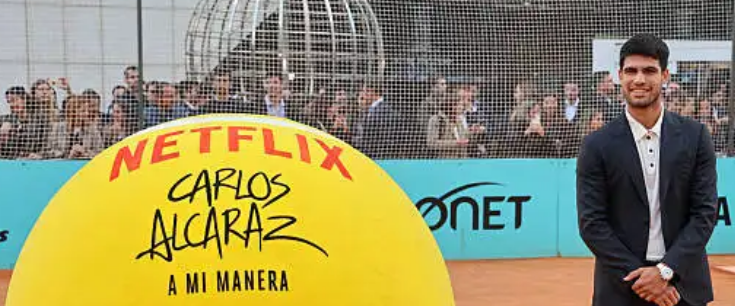Netflix’s Carlos Alcaraz: My Way, a 3-episode docuseries released last month, dives into the 2024 season of Carlos Alcaraz, the 21-year-old Spanish star, who’s already claimed 4 Grand Slams, and the title of youngest ATP No. 1.
Directed by Jorge Laplace and produced by Morena Films, the series follows Alcaraz’s desire to balance his (or perhaps his team’s) ambition to be the greatest tennis player ever, with his need to live as authentically as he can while still a young man. While it offers honest moments and rare access to Alcaraz’s world, its polished narrative and promotional undertones keep it from being the unfiltered portrait fans might hope to see.
It also creates a sense of unnecessary negativity around Carlos. The narrative that he’ll never be the greatest of all time, should he continue to live a life away from the tennis courts, doesn’t quite sit comfortably. Still, for tennis lovers, the series is a welcome addition, as it’s not often that one of the best players of an era, allows such close access to their world.
A Star in the Making, But Still a Kid From Murcia
The series shines brightest when it shows Alcaraz as “Carlitos,” the down-to-earth Murcia native who cherishes family, friends, and home-cooked meals. We see him in his childhood bedroom, surrounded by trophies and tennis shoes, joking with his mum about living with her until he’s 50.
These scenes, including family meals on his terrace and birthday celebrations with lifelong friends, show Alcaraz clinging to normality, despite his rapid rise to the top of the sport. His mother, Virginia, is exactly as a mother should be, prioritizing his happiness over unyielding ambition—a complete contrast to the pressures his entourage continues to push.
The documentary doesn’t shy away from Alcaraz’s vulnerabilities. He admits to moments of doubt, even contemplating quitting tennis when the sport feels like an “obligation.” His confession – “I constantly feel like I’m trapped” – reveals the mental toll of a sport that rarely gives young athletes time to breath.
Yet, these moments are often cushioned by curated footage, like his tearful post-Olympic final interview with Alex Corretja, which is not exactly revelatory, but nonetheless, shows the disappointment of falling short in Paris. The series’ most authentic and fun moments, comes in unscripted scenes, like Alcaraz and his brother Álvaro celebrating the 2024 Roland Garros title in a car, or sneaking peeks at Spain’s Euro 2024 matches during Wimbledon.
The Team Behind Him
A major strength (or possibly weakness, depending on how you look at it) of My Way is its focus on Alcaraz’s team—coach Juan Carlos Ferrero, agent Albert Molina, physiotherapists Juanjo Moreno and Alberto Lledó, and brother Álvaro. The series points out their sacrifices, and the emotional weight they carry to support Alcaraz’s dreams.
Ferrero, in particular, is an interesting figure, balancing tough love with genuine care. He questions whether Alcaraz can become the greatest without embracing greater sacrifice, especially after vacations in Ibiza which Alcaraz decided to take off his own bat. However, I question whether we need to be putting ‘the greatest ever’ tag on such a young man. And if he doesn’t become the greatest player in the sport, because he wants to live a few normal moments while growing up, is that really such a bad thing?
These moments, while possibly dramatized somewhat, underscore the central narrative: Alcaraz’s desire to live freely versus the discipline required to rival the “Big 3” (Nadal, Federer, Djokovic).
The series also weaves in insights from tennis icons like Rafael Nadal, Roger Federer, and John McEnroe, who contextualize Alcaraz’s potential. Nadal’s advice about sustaining motivation over years and Federer’s emphasis on enjoying the journey resonate with Alcaraz’s struggle to find balance. However, the documentary avoids deeper exploration of his young rivalry with Jannik Sinner, which perhaps might be a missed opportunity to contrast their styles and personalities.
Triumphs and Tensions
My Way chronicles Alcaraz’s 2024 highs and lows. His Roland Garros triumph, overcoming cramps and a grueling semifinal against Sinner, displays all of his on-court fight. The series also captures the emotional weight of his Olympic losses—both in doubles with Nadal and the singles final against Djokovic—where his heartbreak is laid bare for all to see.
Yet, it also delves into his struggles, like the forearm injury that forced him to withdraw from Barcelona and mentally blocked him in Madrid. Ferrero’s critique that Alcaraz needs to play through pain to be truly great, raises some slightly uncomfortable questions about the pressure he faces from those with financial stakes in his success.
The Ibiza vacations, framed as a rebellion against his team’s expectations, are a double-edged sword. They highlight Alcaraz’s youth and need for fun—celebrating with “wine, champagne, and everything else” after Roland Garros—but the team’s disapproval, especially Ferrero’s, risks portraying him as unprofessional, which for my mind, seems rather unfair.
His subsequent Wimbledon wins in 2023 and 2024 suggest he thrives under his own terms, but the documentary’s heavy-handed emphasis on this conflict feels like manufactured drama. And I can’t work out why they would want to go down that path….
A Controlled Narrative
As with many athlete-driven projects, My Way isn’t a true documentary. Alcaraz’s creative control and financial stake ensure a narrative that aligns with his desired image: a fun-loving, relatable star, with a slightly rebellious streak, distinct from the stoic dedication of Nadal or Sinner.
While this persona is endearing, it limits the series’ depth. Critical moments of the season, like his mental slump post-Olympics or the 2024 US Open, where he lost in the 2nd Rd to Botic Van de Zandschulp, are glossed over, or not even touched on at all, and the reliance on official highlights for emotional peaks, dilutes their impact. The series’ final attempt to paint Alcaraz as some sort of life coach, who teaches his team to embrace joy, feels a little forced, especially at 21 years of age.
Conclusion
Despite its flaws, Carlos Alcaraz: My Way is a welcome addition to tennis documentaries. Let’s be honest, tennis doesn’t have a huge track record of quality docos. It offers unprecedented access to a player who rarely opens up beyond press conferences. For fans, the behind-the-scenes footage of tournaments like Roland Garros, Wimbledon, and the Laver Cup, combined with Alcaraz’s charisma, makes it fun to watch. The series also creates discussion on the sacrifices required to chase greatness, and whether Alcaraz can succeed on his own terms.
As Alcaraz himself says, “I definitely prefer to put happiness before any kind of accomplishment, because being happy is an accomplishment.” Whether this is genuine, or a nice, scripted quote for the public, it’s a perspective that is good to hear. For tennis fans and casual viewers alike, this series is worth a look, but falls short of being a ‘must-watch’.
Follow The Tennis Site on X and Facebook: @thetennissite
Follow Todd Scoullar on X: @toddscoullar


Comments are closed, but trackbacks and pingbacks are open.